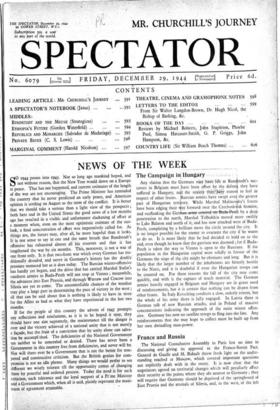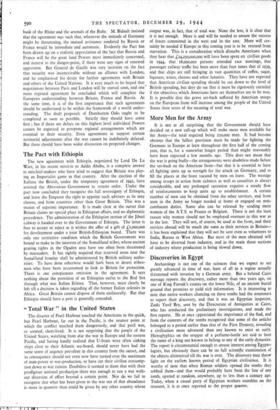France and Russia
The National Consultative Assembly in Paris lost no time in discussing and giving its approval to the Franco-Soviet Pact. General de Gaulle and M. Bidault threw fresh light on the und:r- standing reached at Moscow, which covered important questions not explicitly dealt with in the treaty. It is now clear that the negotiators agreed on territorial changes which will peculiarly affect their security at the points where they ate nearest to Germany ; they will require that Germany should be deprived of the springboard of East Prussia and the arsenals of Silesia, and, in the west, of the left
bank of the Rhine and the arsenals of the Ruhr. M. Bidault insisted that the agreement was such that, whenever the attitude of Germany might be threatening, the mutual assistance rendered by Russia or France would be immediate and automatic. Evidently the Pact has been drawn up on a realistic appreciation of the fact that Russia and France will be the great land Powers most immediately concerned, and nearest to the danger-point, if there were any signs of renewed aggression. But General de Gaulle was very insistent on the fact that security was inconceivable without an alliance with London, and he emphasised his desire for further agreements with Britain and others of the United Nations. It is very much to be hoped that negotiations between Paris and London will be started soon, and one more regional agreement be concluded which will complete the European understanding between Britain, France and Russia. At the same time, it is of the first importance that such agreements should be understood to be within the framework of a world under- standing. The draft proposals of Dumbarton Oaks ought to be completed as soon as possible. Strictly they should have come first ; but if there are delays on this highest level individual Powers cannot be expected to postpone regional arrangements which are essential to their security. Even agreements to support certain territorial adjustments after the war cannot be indefinitely delayed. But there should have been wider discussion on proposed changes.



























